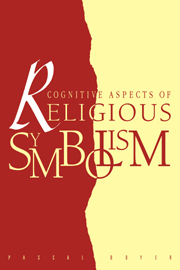Book contents
- Frontmatter
- Contents
- List of contributors
- I Cognitive processes and cultural representations
- II The structure of religious categories
- III Acquisition and belief fixation
- IV The structure of ritual action
- 9 Cognitive categories, cultural forms and ritual structures
- 10 The interactive basis of ritual effectiveness in a male initiation rite
- References
- Index of names
- Subject Index
9 - Cognitive categories, cultural forms and ritual structures
Published online by Cambridge University Press: 05 November 2011
- Frontmatter
- Contents
- List of contributors
- I Cognitive processes and cultural representations
- II The structure of religious categories
- III Acquisition and belief fixation
- IV The structure of ritual action
- 9 Cognitive categories, cultural forms and ritual structures
- 10 The interactive basis of ritual effectiveness in a male initiation rite
- References
- Index of names
- Subject Index
Summary
Introduction
The recognition that human beings learn more than they are taught, already prefigured quite early in the Platonic literature and much later in Kant's notion of the synthetic a priori, continues to intrigue scholars concerned with cognitive matters, especially those with a stake in the possible impact of the cognitive sciences on culture theory. In fact, much to the dismay of empiricists, it has breathed new life into the rationalist tradition. Possessing more knowledge than instruction can account for obviously presents a puzzle worth solving.
Among cognitive theoreticians (especially in generative linguistics and cognitive anthropology) the acquisition puzzle has given rise to a range of suggested solutions. At one end of the theoretical spectrum proponents of the autonomy of cultural systems postulate the presence and operation of very subtle and hidden cultural forces silently transmitting culturally constrained cognitive knowledge from a ‘cultural system’ to the largely ‘empty’ minds of cultural participants. At the other end of the spectrum nativists proffer innate cognitive mechanisms, replete with cognitive content, as solutions to ‘the discrepancy problem’. Even theorists in the middle seem willing to nudge the direction of research in one direction rather than the other.
There can be little doubt that arguments about acquisition take place in contentious territory. The issues are by no means resolved. Proof of that lies in the continuing combat between non-nativists and nativists about the significance of, and the solutions to, the noted discrepancy between the amount of cultural knowledge by explicit tuition and the actual knowledge a person in that culture possesses as well as about the most adequate explanatory models capable of accounting for the discrepancy.
- Type
- Chapter
- Information
- Cognitive Aspects of Religious Symbolism , pp. 188 - 206Publisher: Cambridge University PressPrint publication year: 1993
- 3
- Cited by



